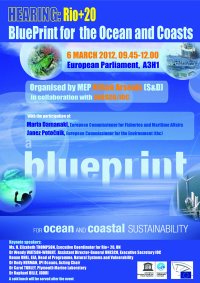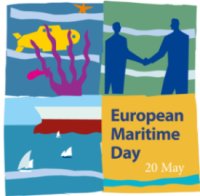Preparing for Rio: Our Key Targets for Oceans and Coasts

Symposium "A Blueprint for Oceans and Coasts"
European Parliament, 6 March 2012
The United Nations "Rio plus 20" Conference on Sustainable Development, which will take place in June 2012, presents a unique opportunity for countries and their citizens to commit to the protection of our oceans and seas with the aim also of enhancing their contribution to sustainable development. During this upcoming event at the European Parliament, key issues regarding oceans and coasts in the context of sustainable development will be presented and discussed. Commissioner Maria Damanaki spoke at the symposium "A Blueprint for Oceans and Coasts at the UN Conference on Sustainable Development (Rio+20) - Issues, Challenges and Solutions", at the European Parliament.

Mr Chair, dear Mr Lalonde, Ms Watson-Wright, Members of Parliament,
I am delighted to speak to you today and I’d like to thank once again the organizers of this symposium for their timely initiative. It is indeed urgent that we address the ocean challenge. There are few greater ones. This year, we simply have to make progress.
In Rio, the Commission’s stance will be firm and clear: first, ocean issues must be one of the priorities; second, business as usual is not an option. The oceans have entered a period of consequences and we have to take action - immediate action - to reverse that.
The maritime economy in Europe accounts for a production value of some 450 billion euro.
This value could be even higher, if marine resources were exploited sustainably. If protected and well managed, the seas can unlock smart growth and sustainable development; they can create high-value jobs and contribute to the continent's economic recovery.
We need to accelerate this process by finding a dynamic yet responsible way to use marine resources for the benefit of mankind. In Rio, we will join the United Nations in saying that we now need “green investments” for a “blue world”.
The European Commission is taking up the ocean challenge by working on several fronts: modernizing the Common Fisheries Policy is one of them.
We urgently need to tackle a legacy of overfishing, illegal fishing, and discarding practices.
I recently tabled a radical reform of our Common Fisheries Policy which is being examined as we speak by our Member States and by this House. My plan is to make our policy simpler, greener and more region-specific.
If approved, the reform will allow us to stop overfishing, apply the concept of Maximum Sustainable Yield to fisheries management and implement an ecosystem based approach, as agreed in Johannesburg. It will bring new prosperity to the industry and end the dependence on public subsidies; and it will allow us to eliminate discarding.
In parallel with the reform, we are already implementing rules to counter illegal fishing worldwide; we strive to establish marine protected areas; and we have undertaken a more coherent and integrated management of sea areas that maximizes the effects of sector-based policies.
The reform of the EU's fisheries policy, the fight against illegal fishing and our Integrated Maritime Policy are real, concrete actions and building blocks to go to Rio with.
They will show that we are determined to renew our commitments and correct the flaws that prevented us from achieving many of the goals agreed in the past: in Rio twenty years ago, in Johannesburg in 2002 and in Nagoya in 2010.
We are also ready to add new objectives, for instance on ocean acidification, marine litter and marine pollution. We want to give a first-rate example of how to manage the world's seas and oceans.
But everything we do will only have a limited impact if our efforts remain isolated. Issues are global: we need our global partners to work with us. We need a common commitment. We need to share goals and responsibility.
For this reason, the EU will show in Rio its intention to step up external action at bilateral, multilateral and global level. There are two main global issues on which we are determined to make progress in Rio.
The first issue concerns fisheries. For the European Union, the way forward is clear: we need to improve governance, enforce the rules, and eradicate both discarding and illegal fishing through international cooperation.
Discarding is a serious problem affecting fisheries all over the world. According to FAO, around seven million tones of marine life are killed and dumped overboard every year because unwanted.
This practice goes against any sound environmental principle and even common sense. Consumers are voicing their discontent. It is a disgrace.
With our reform, we plan to phase out discards and gradually get to a total ban by 2016. A roadmap is also needed for the rest of the world.
The fight against illegal fishing is also very high on the European agenda. We have recently introduced a catch certificate system that is proving effective.
This year's conference is an opportunity for the international community to commit toward a worldwide catch certification scheme. Global zero tolerance on IUU is another key message we want to bring to Rio.
Moreover, we want to fuel the ratification process so that key international agreements, such as the UN Convention on the Law of the Sea, the UN fish stocks agreement or the FAO port state measures, are ratified and implemented by all partners. This would improve fisheries governance worldwide.
The second part of our vision concerns the protection of marine biodiversity.
In Johannesburg, in 2002, it was agreed to maintain the productivity and biodiversity of important and vulnerable marine and coastal areas in areas both within and beyond national jurisdiction.
But the issue of integrated governance was not tackled. Right now, mitigation measures are largely uncoordinated.
This fragmented approach is preventing us from establishing an integrated, ecosystem-based strategy and from assessing the state of the marine environment. It has also slowed us down in establishing marine protected areas.
A multilateral agreement under the United Nations Convention on the Law of the Sea in this area is clearly needed.
This is a strong message we intend to convey to the UN General Assembly in June: there is a serious governance gap which needs to be tackled. Biodiversity protection has to be an overarching objective of the international community.
The EU is committed towards a new implementing agreement of UNCLOS which would address both the conservation and the sustainable use of marine biological diversity in areas beyond national jurisdiction; which would address the issues of marine protected areas and environmental impact assessments; and which would settle the question of access rights to marine genetic resources in those areas and of how to share the benefits deriving from them.
If past experience in managing shared fisheries resources on the high seas is anything to go by, we need to shift from the traditional perception of "open access" to marine resources to a concept of shared responsibility over the global commons. This is a vision we will push forward in Brazil.
To conclude, ladies and gentlemen,
The European Union has set ambitious objectives for Rio. The Commission will participate constructively, with the aim of achieving a positive outcome. I urge all Parties to commit strongly, so that substantial progress can be made.
This is a good opportunity to take decisive action for the environment and improve international governance, notably for the seas and oceans, including for fisheries.
But it is also an opportunity to start using the oceans' economic potential. They can deliver smart, green and sustainable growth. Isn’t that, among other things, what Europe needs right now?
Thank you.


 European Maritime Day 2013
European Maritime Day 2013 Reform of the Common Fisheries Policy
Reform of the Common Fisheries Policy 12 hours for Greece
12 hours for Greece